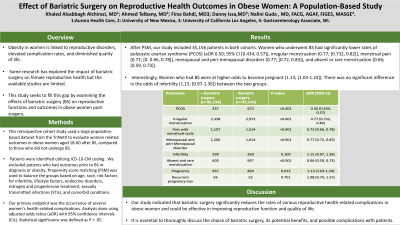Tuesday Poster Session
Category: Interventional Endoscopy
P4472 - Effect of Bariatric Surgery on Reproductive Health Outcomes in Obese Women: A Population-Based Study
Tuesday, October 29, 2024
10:30 AM - 4:00 PM ET
Location: Exhibit Hall E

Has Audio

Khaled Alsabbagh Alchirazi, MD
Aurora Healthcare
Brookfield, WI
Presenting Author(s)
Khaled Alsabbagh Alchirazi, MD1, Ahmed El Telbany, MD, MPH2, Firas Bahdi, MD3, Danny Issa, MD4, Nalini Guda, MD, FACG5
1Aurora Healthcare, Brookfield, WI; 2University of New Mexico, Albuquerque, NM; 3David Geffen School of Medicine at UCLA, Glendora, CA; 4David Geffen School of Medicine at UCLA, Los Angeles, CA; 5GI Associates, Milwaukee, WI
Introduction: Obesity in women is linked to reproductive disorders, elevated complication rates, and diminished quality of life. Although some research has explored the impact of bariatric surgery on female reproductive health, the available studies are limited. This study seeks to fill this gap by examining the effects of bariatric surgery (BS) on reproductive functions and outcomes in obese women post-surgery.
Methods: This retrospective cohort study used a large population-based dataset from the TriNetX to evaluate women related outcomes in obese women aged 18-60 after BS, compared to those who did not undergo BS. Patients were identified utilizing ICD-10-CM coding . We excluded patients who had outcomes prior to BS or diagnosis or obesity. Propensity score matching (PSM) was used to balance the groups based on age, race, risk factors for infertility, lifestyle factors, endocrine disorders, estrogen and progesterone treatment, sexually transmitted infections (STIs), and comorbid conditions. Our primary endpoint was the occurrence of several women’s health-related complications. Analysis done using adjusted odds ratios (aOR) with 95% confidence intervals (CIs). Statistical significance was defined as P < .05.
Results: After PSM, our study included 35,156 patients in both cohorts. Women who underwent BS had significantly lower rates of polycystic ovarian syndrome (PCOS) (aOR 0.50; 95% CI [0.434, 0.57]), irregular menstruation (0.77; [0.732, 0.82]), menstrual pain (0.72; [0. 0.66, 0.78]), menopausal and peri-menopausal disorders (0.77; [0.72, 0.83]), and absent or rare menstruation (0.66; [0.59, 0.73]). Interestingly, Women who had BS were at higher odds to become pregnant (1.13; [1.03-1.24]). There was no significant difference in the odds of infertility (1.15; [0.97-1.36]) between the two groups.
Discussion: Our study indicated that bariatric surgery significantly reduces the rates of various reproductive health-related complications in obese women and could be effective in improving reproductive function and quality of life. It is essential to thoroughly discuss the choice of bariatric surgery, its potential benefits, and possible complications with patients.
Note: The table for this abstract can be viewed in the ePoster Gallery section of the ACG 2024 ePoster Site or in The American Journal of Gastroenterology's abstract supplement issue, both of which will be available starting October 27, 2024.
Disclosures:
Khaled Alsabbagh Alchirazi, MD1, Ahmed El Telbany, MD, MPH2, Firas Bahdi, MD3, Danny Issa, MD4, Nalini Guda, MD, FACG5. P4472 - Effect of Bariatric Surgery on Reproductive Health Outcomes in Obese Women: A Population-Based Study, ACG 2024 Annual Scientific Meeting Abstracts. Philadelphia, PA: American College of Gastroenterology.
1Aurora Healthcare, Brookfield, WI; 2University of New Mexico, Albuquerque, NM; 3David Geffen School of Medicine at UCLA, Glendora, CA; 4David Geffen School of Medicine at UCLA, Los Angeles, CA; 5GI Associates, Milwaukee, WI
Introduction: Obesity in women is linked to reproductive disorders, elevated complication rates, and diminished quality of life. Although some research has explored the impact of bariatric surgery on female reproductive health, the available studies are limited. This study seeks to fill this gap by examining the effects of bariatric surgery (BS) on reproductive functions and outcomes in obese women post-surgery.
Methods: This retrospective cohort study used a large population-based dataset from the TriNetX to evaluate women related outcomes in obese women aged 18-60 after BS, compared to those who did not undergo BS. Patients were identified utilizing ICD-10-CM coding . We excluded patients who had outcomes prior to BS or diagnosis or obesity. Propensity score matching (PSM) was used to balance the groups based on age, race, risk factors for infertility, lifestyle factors, endocrine disorders, estrogen and progesterone treatment, sexually transmitted infections (STIs), and comorbid conditions. Our primary endpoint was the occurrence of several women’s health-related complications. Analysis done using adjusted odds ratios (aOR) with 95% confidence intervals (CIs). Statistical significance was defined as P < .05.
Results: After PSM, our study included 35,156 patients in both cohorts. Women who underwent BS had significantly lower rates of polycystic ovarian syndrome (PCOS) (aOR 0.50; 95% CI [0.434, 0.57]), irregular menstruation (0.77; [0.732, 0.82]), menstrual pain (0.72; [0. 0.66, 0.78]), menopausal and peri-menopausal disorders (0.77; [0.72, 0.83]), and absent or rare menstruation (0.66; [0.59, 0.73]). Interestingly, Women who had BS were at higher odds to become pregnant (1.13; [1.03-1.24]). There was no significant difference in the odds of infertility (1.15; [0.97-1.36]) between the two groups.
Discussion: Our study indicated that bariatric surgery significantly reduces the rates of various reproductive health-related complications in obese women and could be effective in improving reproductive function and quality of life. It is essential to thoroughly discuss the choice of bariatric surgery, its potential benefits, and possible complications with patients.
Note: The table for this abstract can be viewed in the ePoster Gallery section of the ACG 2024 ePoster Site or in The American Journal of Gastroenterology's abstract supplement issue, both of which will be available starting October 27, 2024.
Disclosures:
Khaled Alsabbagh Alchirazi indicated no relevant financial relationships.
Ahmed El Telbany indicated no relevant financial relationships.
Firas Bahdi indicated no relevant financial relationships.
Danny Issa: Boston Scientific – Consultant, Speakers Bureau. Eli Lilly – Speakers Bureau.
Nalini Guda: Boston Scientific, Hemostasis LLC – Consultant. Lupin Pharmaceuticals India – Speakers Bureau. sabela/Braintree – Advisory Committee/Board Member.
Khaled Alsabbagh Alchirazi, MD1, Ahmed El Telbany, MD, MPH2, Firas Bahdi, MD3, Danny Issa, MD4, Nalini Guda, MD, FACG5. P4472 - Effect of Bariatric Surgery on Reproductive Health Outcomes in Obese Women: A Population-Based Study, ACG 2024 Annual Scientific Meeting Abstracts. Philadelphia, PA: American College of Gastroenterology.
